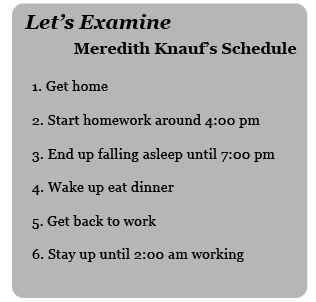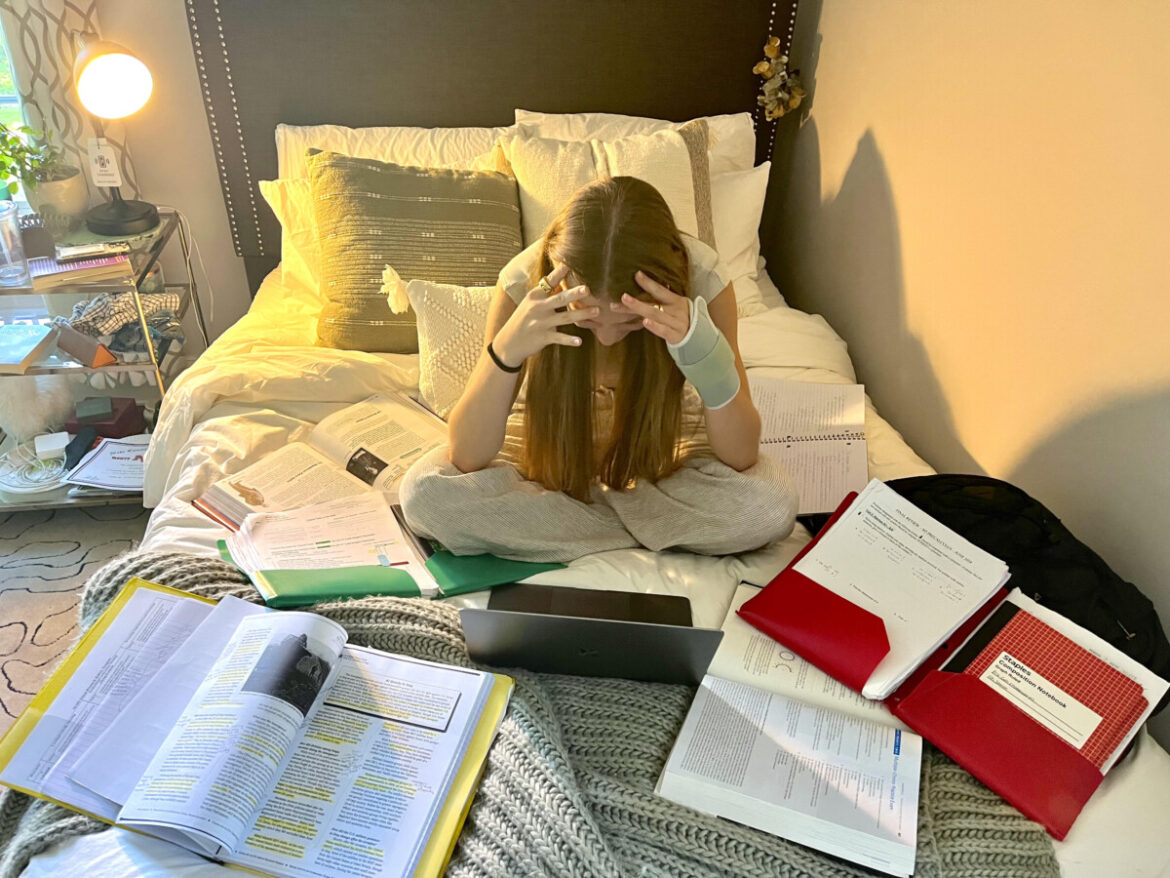Tahlia Scherer, Features Editor
@tscherercourant
Senior year is a beast.
Imagine the average high school senior. Now, juxtapose that picture with an image of an average wild beast – one donning sharp claws, unruly fur and a gruff expression. Is there much of a difference?
Just kidding.
While hyperbolic, there is some truth to that analogy. Many seniors possess a superficial exterior under which their true identities lie dormant.
Don’t get me wrong, this beast-like condition among seniors is not an effort to characterize them as dangerous or aggressive. Rather, it is an attempt to illustrate how seniors are the victims of a curse.
This curse, more commonly referred to as “Senioritis,” is a pervasive condition among seniors. Senioritis is generally defined as, “affliction of students in their final year of high school, characterized by a decline in motivation or performance.” It is at this point in the school year that seniors find themselves in purgatory, dangling between graduation and college. Senioritis has become synonymous with the culture among seniors, who have normalized general detachment and a severe lack of motivation in school.
While deeply infecting the senior class, this condition is not limited to them. In fact, it seems that this contagious disease has begun spreading to juniors, taking on a new name and manifesting new symptoms. This disease is called junioritis.
If senior year is a beast, then junior year is its father.
The monster that is junioritis transcends the typical catch-all phrases of “stress”, “anxiety,” and “depression.” Rather, this infliction is cyclical, if not incurable.

“This put me into a never-ending cycle because my exhaustion from the night before would cause me to fall asleep mid-day the following day, leading me to work late hours, starting the cycle all over again,” Meredith said.
During 2022, Superintendent Brian Luizzi and the New Canaan school district reimagined the ‘portrait of a graduate’ wherein a team of 100 – 150 members discussed the “knowledge, skills and habits of mind that all graduates of our school district should have and should be demonstrated throughout their time in school,” Luizzi said.” Is the New Canaan school system truly cultivating the learning, growth and development necessary for a graduate student?
Junior Susanna Rittenberry weighs in. “Almost all my homework is not enjoyable, and I do them for the grades,” she said. “I find most of my homework is not very helpful and extremely tedious. I dislike taking notes, especially for classes like APUSH, which has a very dense and wordy textbook.”
Junior Arnav Chaudhary shared similar sentiments. “Legitimate assignments that help me learn new content or prepare for tests are enjoyable in that they are satisfying when I complete them, but assignments that are busy work are a drag, and I do them just for the grade.”
Students are shackled to their homework, at the mercy of the countless, and often unpredictable assignments from our teachers.
According to the Center of Disease Control (CDC), the adolescent years are the most important for socialization and development. Yet in the context of the boiler room that is junior year, socialization seems to be forsaken. “I tend to get very bogged down by my school work. It’s difficult for me in the winter and early spring, when everything is gray, to stay positive,” said Susanna. “It is a terrible feeling to come home after a long tedious day of school, hoping to relax or spend your time doing something you enjoy, only to realize you have five more hours of work ahead of you. I think this cycle makes it very easy to seclude yourself and fall into a darker place.”
What was once a staple of school – spending time with friends in the playground or outside of class – has become something of the past, a source of nostalgia, rather than reality.
Furthermore, as juniors find themselves increasingly sucked into their work, their level of motivation begins to dwindle proportionately. “I won’t lie, I am pretty burnt out at this point in the year,” Meredith said. “I put all my energy into studying for a test and then next thing I know I have another one the next day. It’s hard because I put a lot of effort into my studies and sometimes my grades don’t reflect that. Thus I have lost motivation because I feel like I am not being rewarded for my hard work.”
On top of that, it doesn’t help that college applications loom in the near distance. “College applications have always been at the back of my mind, and after the first semester of junior year, it has become a crucial focus,” Arnav said. “I feel that, to some extent, college admissions – especially with the current focus on subjective items like essays and the “whole person” – are a black box. All you can do is try your best and do everything in your power, but there are things beyond your control.”
“College applications are extremely influential to my life, and my school work. My classes are 100% chosen to create the best possible college application. Even my extracurriculars and hobbies are chosen and valued by their impact on my applications,” said Susanna. “It always feels like I could be doing more, and there is a lot of pressure to exceed in school and in extracurriculars and that contributes to my feelings of burnout.”
Moreover, the college application process fosters an environment of competition among peers, a culture in which students feel as though they are perpetually falling short. “I am constantly comparing myself to others and feeling more self conscious as people converse about the various colleges they’ve attended and their ‘expansive’ resumes,” Meredith said.
As the walls seemingly begin to tighten around juniors, it becomes evermore more difficult to step back and see the bigger picture. “During the week I am not living in the present. I am constantly worrying about the next test or quiz. I’m sucked into a cycle that has left me drained and lifeless,” Meredith said. “Though I get excited for the weekend each Thursday, I am constantly disappointed because I don’t have time for my extra curricular activities, or even time to simply hang out with my friends. I always have extensive homework assignments and projects. It is as if some of these teachers assume we do not have a life outside of our studies.”
“I am very conscious of my awareness, and I try my hardest to stay in the present moment. Sometimes, school makes it very difficult to stay in the present however, as most of the time I don’t want to be in the classroom,” Susanna said, “Thus it is easy to take your mind out of the present, and focus on dreams for the future, or memories of the past.”
As juniors find themselves everywhere but the present, let’s take a moment to reflect.
When asked to describe junior year in one word, Arnav replied, “Befuddled.” “It captures the sense of being both confused and overwhelmed, which often leads to feeling stressed. The confusion comes from the college admissions cycle and career choice, and the overwhelming and stress from the workload,” he said.
“Junioritis is the product of a mentally draining and exhausting school system which pressures students“
Meredith Knauf ’25
Even more, it is a sense of hopelessness. “I would describe junioritis as the academic burnout and exhaustion most juniors feel as the year begins to end,” Susanna said. “We have been working tirelessly since September, and these last few months of school can feel extremely daunting and impossible.”
For many, junioritis is inescapable – a disease for which there exists no cure. It’s easy to claim that spreading awareness and prioritizing student health may benefit the plight of students, however it’s simply not as easy as it seems.
Systems which have been in place for decades – upheld by foundational expectations that become increasingly more unattainable with each passing year – have cultivated an unsustainable lifestyle, one which juniors are taught is the only real path to success in life.
While no junior is physically bound to these principles, it is these unspoken guidelines which dictate their lives, and more importantly their futures. How can we expect our juniors to defy the societal norms which they have been rigidly taught to follow?
“Junior year stress can create habitats of anxiety, bad sleep cycles and poor mental health. As most juniors in rigorous classes know, most of the week is spent either in school or doing homework, and this can amplify feelings of burnout and seclusion,” Susanna said. “It is very easy to bury yourself in schoolwork, and It can become extremely challenging to break this cycle. I know students who have terribly unhealthy sleep schedules, and good quality sleep is one of the most essential things to mental and physical health. I think as a whole, juniors and all high school students need to be aware of this cycle, so they can act in ways, such as ensuring eight hours of sleep or exercising daily, to help combat the effects of “junioritis”.
Without real upheaval, there is no defeating the beast or curing the disease that is junioritis.




